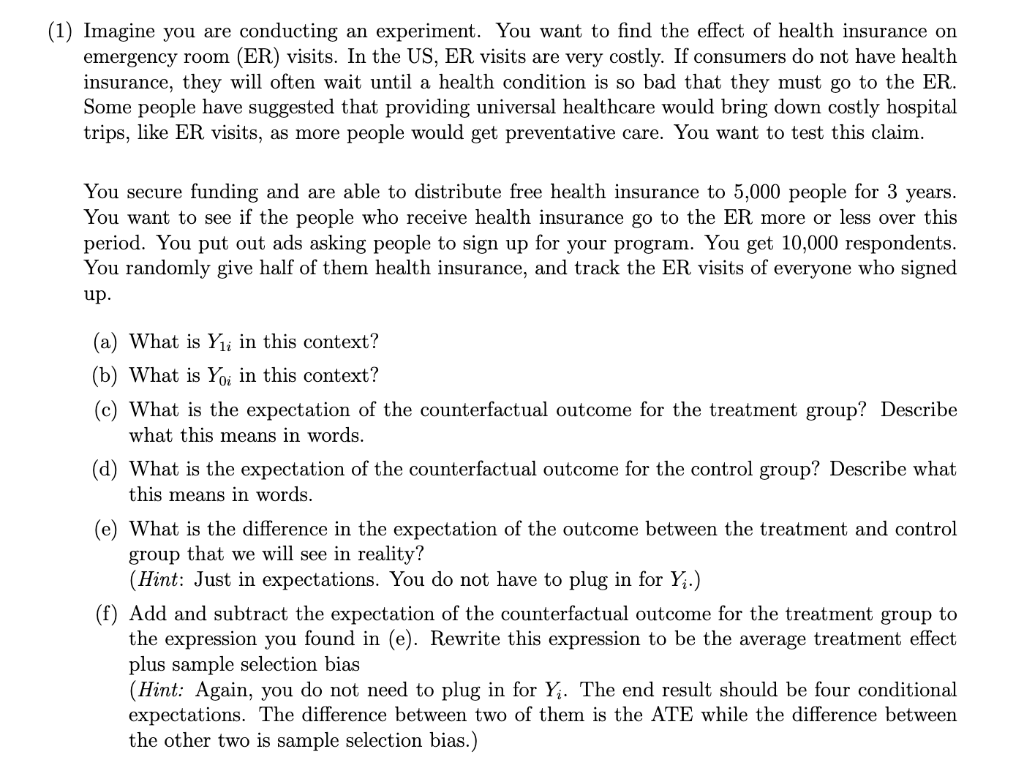I need help with this asap 
(1) Imagine you are conducting an experiment. You want to find the effect of health insurance on emergency room (ER) visits. In the US, ER visits are very costly. If consumers do not have health insurance, they will often wait until a health condition is so bad that they must go to the ER. Some people have suggested that providing universal healthcare would bring down costly hospital trips, like ER visits, as more people would get preventative care. You want to test this claim. You secure funding and are able to distribute free health insurance to 5,000 people for 3 years. You want to see if the people who receive health insurance go to the ER more or less over this period. You put out ads asking people to sign up for your program. You get 10,000 respondents. You randomly give half of them health insurance, and track the ER visits of everyone who signed up. (a) What is Y1i in this context? (b) What is Yo; in this context? (c) What is the expectation of the counterfactual outcome for the treatment group? Describe what this means in words. (d) What is the expectation of the counterfactual outcome for the control group? Describe what this means in words. (e) What is the difference in the expectation of the outcome between the treatment and control group that we will see in reality? (Hint: Just in expectations. You do not have to plug in for Y;.) (f) Add and subtract the expectation of the counterfactual outcome for the treatment group to the expression you found in (e). Rewrite this expression to be the average treatment effect plus sample selection bias (Hint: Again, you do not need to plug in for Y;. The end result should be four conditional expectations. The difference between two of them is the ATE while the difference between the other two is sample selection bias.) (1) Imagine you are conducting an experiment. You want to find the effect of health insurance on emergency room (ER) visits. In the US, ER visits are very costly. If consumers do not have health insurance, they will often wait until a health condition is so bad that they must go to the ER. Some people have suggested that providing universal healthcare would bring down costly hospital trips, like ER visits, as more people would get preventative care. You want to test this claim. You secure funding and are able to distribute free health insurance to 5,000 people for 3 years. You want to see if the people who receive health insurance go to the ER more or less over this period. You put out ads asking people to sign up for your program. You get 10,000 respondents. You randomly give half of them health insurance, and track the ER visits of everyone who signed up. (a) What is Y1i in this context? (b) What is Yo; in this context? (c) What is the expectation of the counterfactual outcome for the treatment group? Describe what this means in words. (d) What is the expectation of the counterfactual outcome for the control group? Describe what this means in words. (e) What is the difference in the expectation of the outcome between the treatment and control group that we will see in reality? (Hint: Just in expectations. You do not have to plug in for Y;.) (f) Add and subtract the expectation of the counterfactual outcome for the treatment group to the expression you found in (e). Rewrite this expression to be the average treatment effect plus sample selection bias (Hint: Again, you do not need to plug in for Y;. The end result should be four conditional expectations. The difference between two of them is the ATE while the difference between the other two is sample selection bias.)







